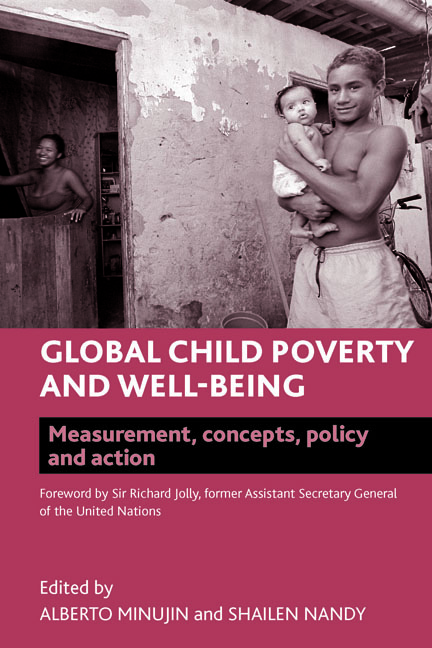seventeen - Changes in child poverty and deprivation in Sub-Saharan Africa and South Asia at the end of the 20th century
Published online by Cambridge University Press: 07 September 2022
Summary
Introduction
The importance of examining and researching child poverty as a distinct topic is now widely acknowledged (UNICEF, 2004, 2007) and reflected by the United Nations (UN) General Assembly's adoption of an international definition of child poverty in 2006 (UNGA, 2006). The financial and economic crisis which swept across the world in 2008/09 has had and will continue to have serious implications for the lives of children and their families, not least because of rising food prices, widespread unemployment and cuts in government expenditure and social service provision (Mendoza, 2009). The UN Children's Fund (UNICEF) Global Study on Child Poverty and Disparities conducted in over 50 countries could not be more timely or appropriate. By examining national policies and collating statistical and other relevant data it emphasises how and why services and programmes for children are of paramount importance. Such programmes require protecting and, in difficult times, expanding (Townsend, 2002, 2008).
The Global Study has produced some excellent country studies on child poverty, many of which have used what has come to be known as the ‘Bristol Approach’ (Minujin et al, 2006; Roelen and Gassmann, 2008), assessing child poverty using indicators of deprivation of basic needs (Gordon et al, 2003). Some countries (for example, Egypt and Senegal) have combined data on both deprivation and household income (UNICEF − Senegal, 2009; UNICEF − Egypt, 2010) to show that (a) estimates of child poverty vary according to the choice of indicator; (b) that when child poverty is seen in terms of deprivation, its prevalence is revealed to be greater than monetary indicators suggest; and (c) that there are important overlaps between different deprivations which can have quite detrimental impacts on children's lives and even their very survival (Notten, 2008). The fact that such studies are being carried out, and the findings presented to governments, shows a growing commitment by researchers, activists and policy makers to investigating and tackling child poverty in its own right. Most studies of child poverty have, until recently, been conducted in rich and transition economies, although UNICEF has now shifted the focus onto children in the rest of the world by arguing forcefully that poverty reduction policies, if they are to have an impact, need to begin with children (UNICEF, 2000).
- Type
- Chapter
- Information
- Global Child Poverty and Well-BeingMeasurement, Concepts, Policy and Action, pp. 419 - 446Publisher: Bristol University PressPrint publication year: 2012



